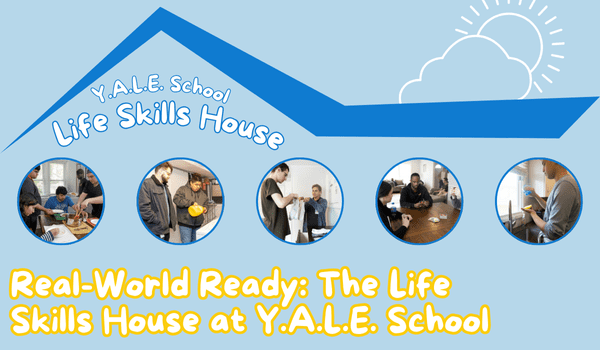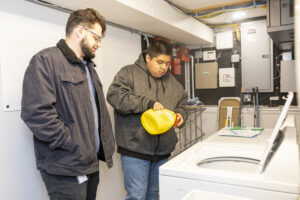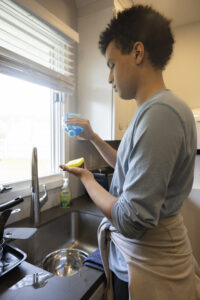
Independent living skills play a crucial role in the transition to adulthood for many students. Skills like cooking, cleaning, laundry, and knowing what to do in an emergency are essential to everyday life. Students at Y.A.L.E. School have the unique opportunity to learn these skills hands-on in a real-life setting at Y.A.L.E. School’s Life Skills House – giving them the chance to learn beyond the classroom.

Located in Cherry Hill, this fully equipped home mirrors everyday living with a family room, living room, bedroom, and outdoor gardening area. Each room provides a unique home-like simulation where students can work on learning essential skills – such as preparing a meal, being mindful of food safety in the kitchen, washing, drying, and folding clothes in the laundry room, and maintaining personal hygiene in the bathroom.
Many students enter Y.A.L.E. School without the repertoire of skills needed to live independently, which is why Y.A.L.E. places a strong emphasis on transition education – helping students gain these skills and have the confidence to move into adulthood with greater independence.
Experiential learning at the Life Skills House prepare students to develop their capabilities through instruction and practice. Whether they will be living in a college dorm, an apartment, or contributing to the upkeep of their family’s home, both traditional and functional approaches systematically pave the way to independence.
“Traditional classroom learning is a great way to introduce students to life skills topics before hands-on teaching occurs. A student should be aware of when to complete the skill in real life, how often to complete the skill, and why the skill is important. When combined, this information provides the necessary context for the life skill,” says Y.A.L.E. School Board Certified Behavior Analyst (BCBA), Jovanna Beardsworth. “If a student is working on toothbrushing, for example, they must also learn that it should be done in the morning and at night for at least two minutes to prevent cavities and bad breath. Simply knowing the steps to brush one’s teeth is not helpful if a student is not aware of when and how often it should be done.”
An important aspect of any learning process is benchmarking and measuring growth. Students who participate in learning at the Life Skills House are assessed through The Assessment of Functional Living Skills (AFLS), a behavior analytic assessment tool that provides a comprehensive overview of the student’s functional abilities. These assessments allow Y.A.L.E. instructors to track students’ progress in acquiring the practical, functional, and essential skills needed for everyday life.
“Every student is assessed using the AFLS through a combination of parent surveys, student surveys, and direct testing. The results provide insight into areas of skill deficits for each specific student,” explains Jovanna. “These areas are then targeted for one-to-one teaching at the Life Skills House. The AFLS results allow us to generate individualized goals for each student and maximize teaching time by focusing on the life skills areas most in need of improvement.”
As part of the learning process, students must demonstrate mastery of skills before they can “graduate” from learning a specific skill. Students must show the ability to complete all steps of a specific life skill independently across three opportunities before instruction concludes. This ensures that the student has practiced the skill independently and is more likely to retain it.

After spending time at the Life Skills House, students’ families have shared that their child’s newfound abilities help them contribute to household routines and chores. With new skills in laundry, meal preparation, basic home upkeep, personal hygiene, and cleanliness, students are better equipped to live with others and independently.
The Y.A.L.E. School Life Skills House isn’t just a place for learning; it’s a place where students gain confidence in their newfound skills and abilities, offering a glimpse into how they can live independently.
“Ultimately, we want all students to take the skills they learn at Y.A.L.E. and apply them in their home environment in order to live as independently as possible,” says Jovanna. “By teaching life skills in a real-life setting rather than a classroom, we increase the likelihood that the student will generalize these skills to their actual home environment, providing a foundation for students to thrive in adulthood.”
To learn more about the Life Skills House, visit our website: https://yaleschoolnj.com/vocational-programs/life-skills-house/
